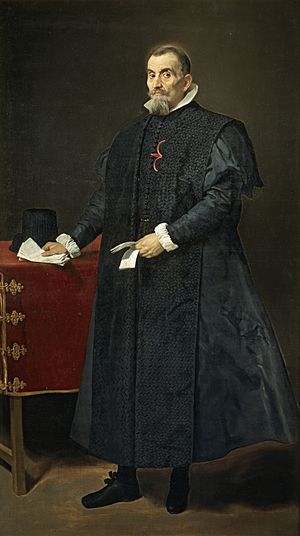Oidor facts for kids
An oidor (pronounced oy-DOR) was a special kind of judge in the Spanish Empire. These judges worked in important courts called the Royal Audiencias and Chancillerías. These courts were the highest places for justice in Spain and its colonies. The word oidor comes from the Spanish verb oír, which means "to hear." This name shows that the judge's main job was to listen carefully to all sides of a legal case.

Contents
The Start of the Oidores
A long time ago, in 1348, the King of Castile, Henry II of Castile, was supposed to listen to all court cases himself. But there were too many cases for one person to handle! So, a group called the Cortes of Alcalá asked the King to get help. They wanted him to let his advisors judge cases for him.
These advisors, who helped the King with legal matters, started to be called oidores. The new court system they formed was known as the audiencia. Even though the oidores were judging, their power still came from the King's own right to hear cases. To help them, court lawyers called relatores would prepare summaries of the cases.
Oidores in the Americas and Asia
As the Crown of Castile expanded its lands far across the ocean, to places like the Spanish colonization of the Americas and the Spanish Philippines, the oidores there had even more jobs. In Spain, other officials handled many tasks, but overseas, the oidores did a lot more.
For example, an oidor in the colonies was not just a judge. They also handled things like:
- Overseeing the sale of special religious documents called indulgences.
- Dealing with mortgages and land payments.
- Managing issues related to probate (what happens to someone's property after they die).
- Handling legal issues between married couples.
Sometimes, in big cities like Mexico City and Lima, an oidor might also serve as a criminal judge. If a governor or viceroy (a high-ranking leader) died or couldn't do their job, the most senior oidor or the entire audiencia would temporarily take over.
Helping Married Couples
One special type of oidor was called the oidor de casados. This judge helped married couples. During the colonization of the New World, many married men left their wives in Spain. They sometimes started new families with other people. The Spanish Crown wanted to fix this problem.
So, the oidor de casados was created to help bring these married couples back together. For example, there was a famous case involving Pedro de Valdivia. The Audiencia of Lima told Valdivia that he had to end his relationship with Inés de Suárez and bring his wife, Marina Ortíz de Gaete, to Chile. Over time, the oidor de casados began to handle all kinds of legal disagreements between married couples.
Church Judges
The word oidor was also sometimes used for judges in church courts, called ecclesiastical courts. These judges were usually clerics (church officials). However, these church oidores were different from the oidores who worked in the Royal Audiencias. They had separate roles and responsibilities.
See also
 In Spanish: Oidor para niños
In Spanish: Oidor para niños
 | Sharif Bey |
 | Hale Woodruff |
 | Richmond Barthé |
 | Purvis Young |

